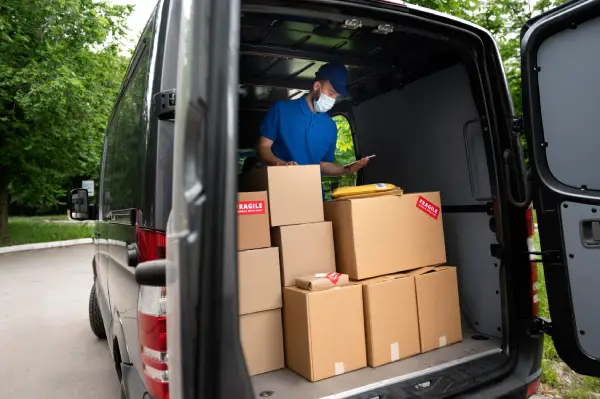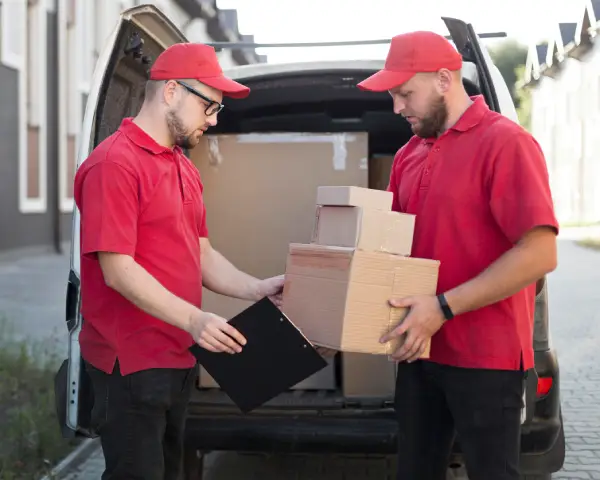The Cargo Van & Freight Delivery Services logistics represent the backbone of economic exchange. This is the vibrant tapestry of global commerce at its best. Contemporary business landscapes have a convoluted connection. A flurry of mobility and transport mechanisms. Cargo Van and freight delivery help now emerging as linchpins of this dynamic fabric. The emblematic payload white panel van is not only a vehicle. They are bustling megacities hubs to the quiet cul-de-sacs of suburban neighborhoods. A modern-day beacon trade, heralding the arrival of goods with precision and efficiency
The distribution of goods is a critical link in the supply chain. Cargo vans and freight services in this continuum stand out for their adaptability. Their crucial role stands out in last-mile delivery. Couriers and freight brokers are the unsung heroes. They bridge the gap between producers and consumers. Averting the logistical chasms that can stall the wheels of commerce. This is a comprehensive navigational guide for those who steward these trade vessels. Those who receive their cargoes. And those who have a vested interest in seeing this industry evolve
Understanding the nuances of this sector is paramount to recognizing its value. Schedule a delivery for load van and portage. It encompasses the effective movement of goods from one location to another. Leveraging a variety of vehicles and logistical strategies. We find three key modalities that cater to different operation scales. They are distinct needs within the landscape
Tailored for shipments that do not need the space of an entire truck. Optimizing cost and efficiency for smaller loads.
Suited for larger-scale deliveries, FTL services provide exclusive use of a dedicated truck
Handling of bulky, heavy, hazardous, or perishable items that need special care. They need special attention during transit.
Traffic congestion, one of the perennial bêtes noires of city logistics. It continues to disrupt delivery timelines and inflate operational costs. In a similar way, last-mile delivery issues, encompassing complexities such as address verification. Limited time windows, and parking restrictions, pose formidable challenges
Advanced technology cargo sprinter van infusion delivery is reshaping moving goods. These features represent only the tip of the technological iceberg:
GPS tracking
AI-Driven Route Optimization
Electronic Logging Devices (ELDs)
These innovations improve efficiency and delivery reliability. They also provide unprecedented transparency for both service providers and customers. The advent of electric and autonomous vehicles heralds a new era of sustainability. Efficiency in logistics, promising to have a significant carbon reduction footprint. Their operational costs also result in lower. The industry is confident to meet the growing rapid demands. They are evolving into a nationwide marketplace. With these technological advancements, , making every shipment faster, safer, and greener.

The delivery fleets’ electrification presents a compelling narrative. Heightened with a global focus on sustainability. Electric vehicles offer reduced operational costs and twin boons. Aligning economic interests with ecological sensibilities and environmental impact

Route optimization stands as a testament to the harmonizing potential of software. Sophisticated algorithms now tailor delivery routes to harness efficiencies. It lowers fuel consumption and reduces carbon footprints to the environmnett
Cargo vans play a pivotal role in freight delivery. Particularly for the burgeoning sector of urban e-commerce. They are often overshadowed by their larger truck counterparts. Their compact size and maneuverability make them indispensable for the last mile. This is where space is at a premium, and the agility to traverse narrow streets is invaluable. This underscores integrating relevant owner-operator merchandise vans. They go into the broader freight strategy, especially in dense populated urban centers
Efficient cargo van day freight delivery services hinge on several essential components. Effective fleet management ensures to dispatch of the right vehicle for the task. Maintain these vehicles and optimize for performance. The intricate logistics dance and routing relies on strategic planning. And the use of sophisticated software to plot optimal pathways. Another equal importance is load management. Ensures to safeguard goods and transported in a manner that preserves their integrity. Technology is reshaping this arena with unparalleled fervor. GPS, IoT devices, and route optimization software are only the tip of the iceberg in a sea of advancements. These innovations are increasing efficiency and also catalyzing significant shifts in the industry

The relentless technology march has brought us to the automation era threshold. Propelled by robotics and artificial intelligence, promises a revolution. These digital cohorts can oversee:
A delicate balancing act is often reconciling the need for efficient, timely delivery drivers. This amounts to the obligations of a conscientious corporate citizen.
The cargo van path load and delivery vans are fraught with hurdles. Their challenges range from stringent regulations to the unpredictable nature of logistics. Among these, regulatory compliance stands out as a particularly Herculean task. Shippers and carriers must keep a constant vigilant stance. They must stay abreast of local, national, and international legislative changes. to avoid hefty fines and disruptions. Additionally, the environmental impact of logistics operations has come under increasing scrutiny. The industry’s carbon footprint is a concern for both regulators and the public. Prompting a shift towards greener alternatives. Then there’s the perennial security and safety challenge. Theft and accidents pose significant risks to both goods and operators.

The industry is a lot reliant on technology and innovative practices. They must tackle these challenges. For regulatory compliance, digitization offers a way forward. Utilizing blockchain technology can enhance transparency and traceability in the supply chain. Making it easier to follow regulations. The shift towards electric and autonomous vehicles is about innovation and necessity. This is the case when it comes to reducing environmental impact. These vehicles promise to lower emissions. In the case of autonomous vehicles, it will reduce accidents. Through more consistent driving behaviors, it will be possible. Enhancing security measures through real-time tracking and tamper-evident technology helps mitigate risks. They are for the most part associated with cargo theft and tampering.
The following can pave the way for more efficient, safe, and eco-friendly logistics:
In essence, the obstacles facing cargo van freight services are sizable.
The best cargo van carriers reduce costs and also enhance supply chain responsiveness. and Customer satisfaction will skyrocket. This virtuous operational excellence cycle spawns economic benefits. They ripple across the commercial seas.
Examining case studies’ success stories offers a compass for aspiring operational efficiency pinnacles. Best practices outline the contours of a successful enterprise. Real-world examples underscore the power of innovation in driving transformation.
A leading global retail company embarked on a drastic overhaul of its delivery fleet. They wanted to combat climate change. Improve the sustainability of its logistics chain. The initiative aimed to transition the company’s entire delivery fleet. Transform their fleet to electric vehicles (EVs) within five years. Dubbed as "Zero Emissions Delivery Solutions. The move prompted growing environmental concerns. An increasing regulatory focus on carbon emissions. And a desire to lead the market in eco-friendly practices
The challenge handling the Zero Emissions Reliable Delivery Solutions project was logistical complexity. The high initial investment required EVs. Yet the lack of extensive charging infrastructure met difficult challenges to overcome. The company also faced skepticism from stakeholders. They had concerns about the impact on shipping services efficiency and operational costs.
The company tackled these challenges head-on by partnering with electric vehicle manufacturers. They addressed concerns about efficiency. They were looking for custom solutions tailored to delivery logistics. They also invested in building charging station networks. They aimed to build it across their major operational hubs. The company integrated sophisticated route optimization software. It considered factors like EV range limits and charging station locations. They launched a major city pilot program. They refined their approach before a full-scale rollout
The pilot project was a resounding success. Leading to improved expedited delivery efficiency and a 40% reduction in operational costs. The major factor was due to lower fuel and maintenance expenses. The Zero Emissions Delivery Solutions initiative reduced the company's carbon footprint. They had a 60% decrease in emissions within the first two years. This initiative enhanced the company’s brand reputation. It also demonstrated the viability and economic benefits of sustainable logistics. By the end of the five-year project, the company had great success. They transitioned 90% of its delivery fleet to electric vehicles. Setting a new industry standard in sustainability efforts
This case study demonstrates the potent blend of:
Anticipating an industry-rife trajectory with innovation is both a humbling and exhilarating prospect. Potential players in the van delivery services game paint a future picture. It is as imminent as it is extraordinary. The autonomous vehicles emergence and drones as innovators set an example for others. The horizon teems with groundbreaking innovations aimed at further revolutionizing this critical sector. This is the best cargo van delivery service industry as we look forward. Among the most anticipated advancements in logistics operations are the integration of:
These technologies are certain to enhance:
Leading to unprecedented levels of efficiency and reliability. 5G technology advent promises to supercharge the industry’s IoT (Internet of Things) capabilities. Ensuring real-time tracking and data analysis are more accurate and faster than ever before. This leap in connectivity and speed will ease more dynamic delivery routes. Ensure smarter warehousing, reducing shipping solutions and costs.
Another potential game-changer is the development of Hyperloop and Maglev cargo transport systems. These high-speed transportation technologies could:
To traditional freight transport methods. Autonomous exploration and drone delivery systems are opening up new possibilities. Companies are competing for “last mile” delivery in urban areas. It has the potential to make same-day deliveries more workable. More accessible across the nation. These innovations herald a future for cargo van owners. Freight delivery trucks are more sustainable. They are more efficient and integrated into the digital and physical fabric of society.
Key Takeaways
Companies are using lading vans emergence and box trucks for courier services. They are using them as pulsating modern engines. Commerce is a testament to the industry’s resilience and adaptability. A commitment to innovation will serve as our lodestar. It happens as we traverse the digital renaissance and the environmental priorities metamorphosis. The path ahead will come with opportunities for those bold enough to seize them. It will steer the course of this evolving industry.
The cargo van services future and freight day delivery industry appears promising. It is not without its challenges and obstacles. A significant hurdle is the technological and logistical complexity. It is like implementing:
Developing and integrating these technologies requires much investment. It also needs a skilled workforce capable of navigating modern logistics tech complexities.
Regulatory and safety concerns also pose potential obstacles. Especially with technologies that are still in their infancy. These are such as drone and autonomous vehicle deliveries. Governments and regulatory bodies play a crucial role in shaping these technologies’ future. Navigating the regulatory landscape could slow down innovation.
Public acceptance and trust in new delivery methods will predominate. Particularly those involving autonomous machines will be critical. Building widespread trust takes time and a successful demonstration of safety and reliability.
Cybersecurity threats are another major concern. Increased digitalization poses new threats. Reliance on AI and IoT devices exposes the industry to potential cyber-attacks. Posing risks to operational security and data privacy.
The transition to greener, more sustainable logistics operations will lead to new opportunities. These are necessary for environmental and regulatory reasons. They need a shift in current business models. This shift involves upfront financial investment. It also promotes cultural change within organizations. It engages across the industry to focus on sustainability alongside efficiency and profitability.
Addressing these challenges will need a concerted effort from all stakeholders. I will include businesses, governments, technology developers, and the public. Ensure the industry’s evolution continues on a positive, sustainable trajectory.